- Home
- Stephen L Carter
The Impeachment of Abraham Lincoln Page 10
The Impeachment of Abraham Lincoln Read online
Page 10
CHAPTER 9
Consolation
I
THEY BURIED ARTHUR McShane the following Monday, in a swirling, feathery snow. The President did not attend the funeral. There had been rumors that he might, and the rumors brought the press out in force, but Lincoln stayed in the White House. Except for the occasional ride out to the Soldiers’ Home, where a stone cottage waited always upon his pleasure, Lincoln had hardly left the Mansion in the year since his wife died. Newspaper stories often described him nowadays as “stooped” or “shrunken,” to say nothing of “moody” or “distracted”—taking care, always, to quote unnamed visitors. According to Dan Sickles, many of the stories were planted by the Radicals, who, faced with the formidable task of reducing the public admiration of the President, had hit upon the strategy of persuading readers that Lincoln had become a pitiful shadow of the man who had won the great war, and no longer possessed the fiber to carry out his duties.
“There is a tradition,” said Sickles, as they sat around the common room later that afternoon, “that once a great war has been won, the leader must at once be deposed. The Romans used to do it. The British, too.”
“Not General Washington,” Abigail pointed out. “He won the war and then served two terms as President.”
“A tradition,” said Sickles, airily. He was stretched on the settee beneath the long window at the end of the room, giving his leg a rest. “Not a law.”
Strained laughter, in which Abigail did not join. She felt, just now, a distance from the others, perhaps because she had been ordered once again to remain behind and hold the fort while the others attended the service and accompanied the remains onward to the Catholic cemetery at Silver Spring. Abigail understood why. Arthur McShane had died in the company of a young black woman. It made perfect sense to spare Mrs. McShane the indignity of burying her husband in the company of another.
The decision rankled nevertheless.
“Speed will be joining us in a day or two,” said Dennard. “He has taken offices on Eleventh Street, but his clerk will work mainly at this table.” A sour glance at the blackboard, where the numbers now read 15–32–7. They had lost both the newly elected Nebraskans, as expected—the result of the broken deal—and one additional Senator, whose name for the moment escaped Abigail. In any event, they were under one-third again, and needed four of the last seven to prevail. The likelihood of Lincoln’s acquittal seemed small, unless they were able to persuade Sumner. But the great man had not budged from his refusal to meet any of the President’s emissaries. Impeachment was no matter, he was known to have told friends, for wheeling and dealing.
“I suppose I should get myself a clerk,” said Sickles. “Everybody else seems to have one.” He glanced at Abigail. “Are you available, my dear?”
She chose to take the question as rhetorical.
“We have a great deal of work, et cetera, ahead of us,” said Dennard. He was a more distant man than McShane, with none of the familiarity or teasing. He was a man of considerable girth, yet lacked the bonhomie common to her experience of fat people. Instead, Rufus Dennard was staid, even stiff, and often spoke in a murmur that suggested that anything louder would constitute a breach of professional ethics. “I see no reason to worry about that habeas nonsense and the rest. That is just for the newspapers. The real fight will be over Counts Three and Four.” Adjusting his thick glasses as he glanced at the broadsheet. “Failing to protect the freedmen. Defying the authority of the Congress, et cetera.”
“In other words,” intoned Sickles, from his spot by the window, “they are irritated at Mr. Lincoln for making up his own mind.” He grunted, shifting the wooden leg to a more comfortable angle. “Our fine solons will not be satisfied until they can give orders to the President.”
Dennard colored slightly but made no response. “The House Managers—that is evidently what the prosecutors are calling themselves—the Managers have promised us a list of their witnesses this week. Under the rules adopted by the Senate, the prosecution is under no obligation to tell us why they are calling particular witnesses, and I believe that the Managers will do their best to confuse us as to their purposes. So among our most important tasks will be—”
A peremptory knock on the door. Before Mr. Little could open it, in strode Edwin Stanton, the Secretary of War, followed by a uniformed soldier with long, luxuriant moustaches and a red patch on his epaulette: the bodyguard who accompanied him everywhere.
Stanton glared around the room. His eyes lingered on Abigail, then swept onward. “Dennard. A word.”
The two men stepped into Dennard’s office, leaving the door ajar. Abigail, sitting nearest, strained to catch a word. Stanton was obviously angry; from what Jonathan had told her of the man, he usually was. She heard “that woman” and she heard “confidential” and she heard “message” and she heard “President.” The choleric and mistrustful Stanton was complaining about her presence. Any moment, Dennard would emerge and command her to the Library of Congress on a trumped-up errand, while the others remained to hear Stanton out.
Then came Dennard’s low rumble, clear as crystal and perhaps meant to be so. “Miss Canner is my clerk. I will not send her away.”
Abigail was unable to help peering into the room. The taller Stanton stared furiously at pudgy Dennard, and Stanton’s anger had been known to reduce the toughest of men to groveling. Even now, two years after the war, those who opposed him too sharply had a way of finding themselves under investigation by War Department auditors, or, in a few sad cases, vanishing into some dank and distant military prison. But pudgy Dennard, leaning against his desk, soft arms folded, was casual in his disdain of Stanton’s power: he did not even bother to contest the stare.
“Very well,” said Stanton. “Be it on your head.”
The two men trooped back into the common room.
Dennard started to speak, but the Secretary of War rode right over him. “Gentlemen,” he said, as if Abigail were not present. “The leaders of this conspiracy are traitors. In any other nation they would hang. But Mr. Lincoln is a meek and forgiving man, the soul of charity. We must therefore let events carry us along a bit longer.” A wet cough nearly bent him in two. “My sources tell me that the Managers are searching for a document, a letter of some kind that supposedly is some sort of admission of guilt on Count Four.” He looked around the room, fingers combing through the rich brown beard. His eyes and nose both watered slightly, and Abigail wondered whether the stories were true, that Stanton used opium. “The letter, supposedly, is in Mr. Lincoln’s hand, or the hand of a close adviser, and discusses a plan, under certain contingencies, to impose military government on the District of Columbia. Not a war measure. The letter, supposedly, is dated after the war. Within the past year and a half.” He paused to allow them to absorb this. He meant, since Lincoln’s troubles with the Radicals began. “I am here to assure you,” Stanton concluded, “that no such letter exists.”
Abigail resisted the urge to look over at Sickles, but recalled sharply the envelope she had caught him removing from McShane’s desk two days after the murder.
Dennard, no fool, filled the silence. “Are you assuring us in your own name or in the name of our client?”
Stanton wiped his mouth on his sleeve. “In this matter, there is no distinction.” He smiled savagely. “Of course, you are always welcome to ask Mr. Lincoln yourself. He will tell you the same.”
“I will likely do exactly that.”
The murderous glare again. “And he will tell you precisely what I said he will tell you.” He looked around. “I’ll tell you what does exist, at least according to rumor. There is a list out there. A list of the men who are conspiring against the President. We will find the list, and then we will hang the conspirators.” With that, Stanton swept up his moustachioed bodyguard by eye, and was gone.
II
As a consolation prize for her exclusion from the funeral that morning, Dennard had given Abigail a motion to draft. Just
for practice, et cetera, he had explained. Not to be filed. Just to see how you do. The motion asked for the exclusion of all testimony in which witnesses would say what others had told them the President said or did. This was covered by the hearsay rule, one of the oldest and most treasured propositions in Anglo-American jurisprudence. In her innocence, Abigail had imagined that she would impress them all by finishing her work by the time the funeral ended; instead, she had barely found time to begin. By the time Stanton left, it was past four in the afternoon. Dennard and Sickles left just after, leaving Abigail and Jonathan alone in the common room.
“I wanted to apologize,” he said after a bit.
“Apologize for what?”
“The funeral—”
“Please, do not trouble yourself. I managed to keep myself occupied.” She returned to the evidence treatise she had been consulting. She had never imagined that there might be so many exceptions to so seemingly simple a rule. She liked her rules straightforward and clear, like the ones Nanny Pork preached at home, and the pastor reinforced on Sundays. She had imagined, somehow, that law would be the same.
“Do you think it exists?” said Jonathan, suddenly. “The letter Stanton was talking about?”
Again she lifted her head. “I really wouldn’t have any idea.”
“I saw your face. You were less surprised than the rest of us. Come on, Abigail. Tell me what you think.”
Again she saw Sickles prying the drawer; and wondered what had possessed her to assist him; and subsequently to keep silent. The excitement of being invited, however briefly, into the inner circle?
“I think,” said Abigail, “that you and I have a great deal of work to do.”
But now she was disturbed. One of those simple rules she so cherished forbade false witness. Real life was always harder than the rules made it seem. Maybe that was why people spent so much time looking for ways around them.
She turned a page, not really concentrating. The gas lamps sputtered. One went out with a gasp of surprise. They both looked up sharply; and laughed; and returned to their work.
But Jonathan found his gaze drawn again and again toward Abigail, whom he found, quite simply, remarkable.
He had never spent so much time in the company of a woman of her color. Those with whom he had had conversations had mostly been women he met in service, or perhaps working in some shop. He had known educated negroes, of course. They were not uncommon at the North. Indeed, at the dinner table of his uncle Thrace, the Episcopal bishop in Boston and a director of the Massachusetts Anti-Slavery Society, Jonathan had been held rapt by the rhetorical brilliance of men like Frederick Douglass and Alexander Crummell and a schoolteacher said to be a grand-nephew of the poet Phillis Wheatley, although that claim, Uncle Thrace told him later, was unlikely: there were faux Wheatley relatives everywhere. A year or two before the war, Jonathan had traveled with his uncle on a trip west to raise funds to purchase slaves and free them. In the town of Chatham, near Toronto, they had sat in the parlor of a man named Stanton Hunton, a major property owner and former slave who had been associated with John Brown, and whose children were all being educated in the modern way. Hunton had become prosperous, and owned valuable land in Canada and Michigan. On the train ride back east, Uncle Thrace assured his nephew that the black man, if once offered the opportunity to improve his mind and keep what he earned, could within a generation or two take his place beside the white in the political councils of the nation. But he said nothing about social life, and he said nothing about the black woman.
Until the moment Jonathan met Abigail Canner, he had never had a lengthy conversation with a woman of the colored race. But once she started talking, he very much wanted her not to stop.
III
“You don’t need to keep driving all the way up to my office,” said Abigail as she climbed up into the trap. “I can perfectly well take the horsecars home.”
“I’m your brother,” said Michael, snapping the reins. “I want you safe.” He laughed, not pleasantly. “Besides. It’s not your office. It’s their office. Haven’t you figured that out by now?”
Abigail lapsed into a sullen silence. There was no point in arguing. Her brother had always known her fears and weaknesses. In consequence, he had always been able to wound her at will. She wondered whether he practiced this skill on his many women, or whether she was his only target. He never picked on Louisa, the youngest, who adored him, and had rarely dared say a cross word to Judith, the eldest, whose tongue could lash with a fervor to rival Nanny’s own. But Judith had vanished: tired of how she carried on with men, Nanny Pork had put her out of the house while Abigail was still away at Oberlin, and nobody had seen her since—
“Where are you going?” said Abigail, looking around. “This is not the way home.”
For Michael had turned the wagon to the right at Pennsylvania Avenue, rather than left toward the bridge over the canal, and was approaching the intimidating granite bulk of the Treasury Department. This route would lead past the Executive Mansion and on into the dangerous slums of George Town, where no sane Washingtonian ventured after dark.
“I thought we might ride around for a bit,” her brother said. His tone was somber, his face a hidden shadow in the night. “I want to talk to you about Senator Wade.”
“Oh?”
“I’ve been reading up on him, Abby,” said Michael. “Wade was for abolition before Lincoln was. He was for arming the slaves before Lincoln was. Wade is for giving the freedmen land and money. He is for keeping troops in all the Southern states, when Lincoln wants to remove them as quickly as possible.” An angry chuckle. “Wade says Lincoln’s views are what you would expect in a man from a slave state, born to poor white trash. I agree.” A sharp nod. “Anyway, I’ve been thinking that it might not be such a bad thing if Old Abe were removed from office. From what I can tell, Wade might be a better man for our people.”
Abigail stared in astonishment. “You cannot seriously be suggesting that you wish the impeachment to succeed!”
“I just don’t see why all the colored folks treat Old Abe like he lifted his staff and parted the waters of the Red Sea.”
“Mr. Lincoln freed our people, Michael. You cannot deny that simple fact. And he has declared that no Southern state may rejoin the Union until it ratifies the constitutional amendment barring slavery.”
“Old Abe was dragged to those positions by better men than—Whoa!” Drawing in the reins; but the horse had already stopped. Up ahead, the grand avenue was blocked by a pair of carriages, halted by a Union soldier. Michael craned his neck; turned to her with a grin. “Well, well. Moses himself, in the flesh.”
Even through the rain they could hear the loud huzzahs up ahead. Abigail stood on her seat but still could not see. Suddenly determined to catch a glimpse of the client she had not been permitted to meet, she climbed down, ignoring her brother’s shout of warning, and pressed through the throng. She reached the front just in time to see Abraham Lincoln himself, victor in the war and savior of her people, crossing Pennsylvania Avenue toward Lafayette Park, trailed by a lone Bucktail, as members of the Pennsylvania regiment who guarded the President were known. Lincoln was heading for the grim fortress known as the Old Clubhouse, home of Secretary of State Seward, his closest friend and adviser, who had not left the house in the two years since he himself was attacked, Lincoln gravely wounded, and Vice-President Andrew Johnson murdered.
Abigail crept closer.
The President was a tall man, and his stovepipe hat made him seem taller, but he was hunched forward against the wind and rain, clutching the brim comically. His long stride made it difficult for the soldier to keep pace. Then Lincoln vanished into the Clubhouse, and the Bucktail took up station by the door. As the onlookers began to disperse, Abigail noticed, to her surprise, dozens of awestruck dark faces in the street. Washington’s colored population usually effaced itself, and the negroes tended to linger toward the back of any crowd. But Lincoln’s presence had drawn the
m forward, as it had drawn Abigail, and now, in the absence of soldiers to restrain them, they formed a loose ring around the Clubhouse.
“For a man who’s been shot in the head,” said Michael, who had come up silently beside her, “Old Abe doesn’t seem to care too much about bodyguards.”
“The war is over,” said Abigail.
As traffic began moving again, Michael nodded across the way, where several hard-faced white men skulked in the shadows. They had not joined in the cheering. “Not for everybody,” he said.
CHAPTER 10
Proposition
I
“THE PRECEDENTS ARE unclear,” said Jonathan. He tried and failed to wish away the slight tremor in his voice, and he knew that his pale cheeks were tinged with pink. These same indicia of nervousness had plagued him at Yale, especially when he was called upon to translate Latin or Greek at speed. Eventually, he had managed to hide the jitters from classmates and professors. But now, speaking for only the second time in the presence of the President of the United States, Jonathan Hilliman felt all the old symptoms return.
It was Tuesday afternoon, and windy, the sky low and gray and impending in a way that foretokened snow. Lincoln had assembled what he called his lawyers’ coterie to discuss tactics for the trial. Rufus Dennard had instructed Jonathan to apprise the coterie of the fruits of his research on the voting rule in the Senate.
“Two-thirds of the votes,” Jonathan continued, “are required to convict. We know that, of course. What we don’t know is what counts as two-thirds.”

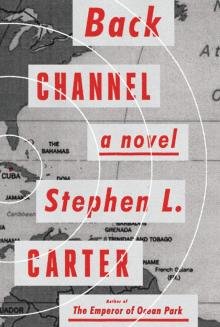 Back Channel
Back Channel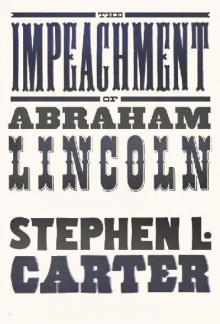 The Impeachment of Abraham Lincoln
The Impeachment of Abraham Lincoln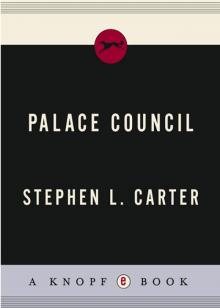 Palace Council
Palace Council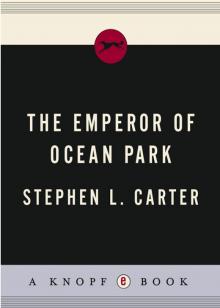 The Emperor of Ocean Park
The Emperor of Ocean Park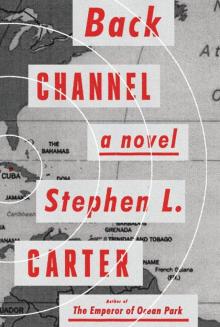 Back Channel: A novel
Back Channel: A novel Emperor of Ocean Park eh-1
Emperor of Ocean Park eh-1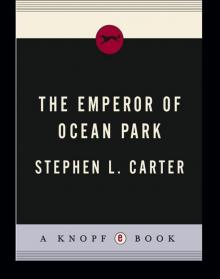 Emperor of Ocean Park
Emperor of Ocean Park